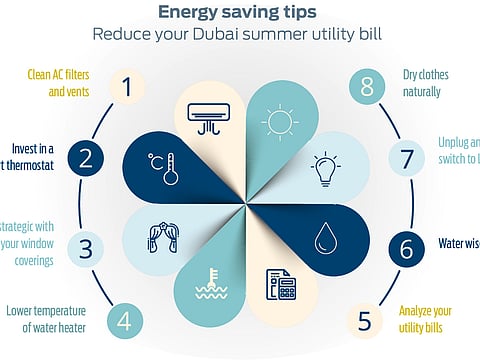Reduce your utility bill this summer
Fadi Nwilati shares energy-saving tips that make you comfortable and don’t break the bank

According to the Dubai Electricity and Water Authority (Dewa), Dubai has one of the world’s highest carbon footprints per head. But the idea of living without air conditioning in the summer months is an unbearable one. Improving your energy efficiency doesn’t have to be difficult and expensive. Here are eight ways to cut on your electric bill in summer.
1. Clean AC filters and vents
Change the filter on your central AC unit once every three months—and as often as once a month if it is running all the time. A filthy filter could add 5-15 per cent to your AC bill and will shorten the lifespan of your whole system.
2. Smart thermostat
A programmable/smart thermostat can save you thousands on your annual AC bill by automatically raising the temperature when you’re at work or away from home. Phone-controlled thermostats make programming even simpler. The cost of these thermostats should be recovered in a couple of months. Alternatively, simply turn the AC off when you are out.
3. Be strategic with your window coverings
Bright sunlight is your AC system’s nemesis. Keep your home cool by closing your blinds and using curtains to stop sunlight from getting in. You can also install window coverings that can decrease heat gain by 25-33 per cent.
4. Lower the temperature of your water heater
Hot water can contribute up to 17 per cent of your household energy usage. Most people keep their water heaters much hotter than necessary to perform basic functions. Lowering the temperature to 40 degrees will cut down your annual energy bill, and chances are you probably won’t even notice the difference. Besides, cooler showers feel more refreshing too!
5. Dry clothes naturally
Clothes dryers are modern technological marvels, but highly inefficient. Their increased use ratchets up energy consumption significantly. Try air drying clothes, especially during the summer months — your utility bill will thank you for it.
6. Unplug, switch to LED
Electronic devices still draw energy when not in use but plugged in, so get into the habit of unplugging anything that’s not needed. In addition, fit LED lights instead of traditional bulbs where possible as they produce less heat, use less energy and last longer.
7. Be water wise
Aerating your faucets, investing in a low-flow toilet, choosing efficient shower heads and opting for a water-sense rated dishwasher and washing machine can add up to big water savings. Ask a plumber to do leak detection every quarter or biannually.
8. Analyse your utility bills
Download Dewa’s smart app and analyse the utility consumption graph. You can also look at the consumption ratio of your neighbourhood and multiple accounts. The data will help you monitor actual consumption for a specific time, and this will help you find solutions to rationalise the consumption of electricity and water resources.
How energy-efficient your home will be is up to you. The best place to start is by understanding how much energy you use each day (and when), as well as which energy saving actions will have the biggest impact on your home.


